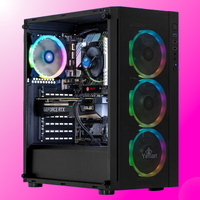Snapdragon X Elite spotted running Baldur's Gate 3 at around 30fps, supporting claims that Windows games 'just work' on ARM chip
Qualcomm's chip might be good for a spot of gaming on the go.

Last week Snapdragon claimed that Windows games "just work" on its latest ARM chip, the Snapdragon X Elite. At the time we said we'd believe it when we see it. Well, now we're seeing it. A small glimpse of it, anyways. Devin Arthur on X has filmed an X Elite laptop running Baldur's Gate 3 at around 30 fps reportedly without any sort of porting taking place.
The video isn't very long (via NotebookCheck) and only covers the starting area of Baldur's Gate 3. The fps counter in the upper left-hand corner of the screen clearly shows it bouncing around just under the 30 fps mark, at least.
Here's a demo of Baulders Gate 3 running at 1080p hovering around 30FPS, which is perfectly playable! https://t.co/ZieiHtzRlN pic.twitter.com/VvFKbUVK5JMarch 25, 2024
You have to appreciate what's actually going on behind the scenes to see why this sort of performance could be a pretty big deal for gaming systems. The game has been developed exclusively for x86 systems: exclusively those built on x86 chips—Intel or AMD chips. The laptop, powered by the Snapdragon X Elite, is running Qualcomm's own custom configuration of the ARM instruction set. To get software for one instruction set to run on hardware with another, a translation layer is required.
You might be familiar with a translation layer if you're a Steam Deck user. Valve employs one called Proton to turn most Windows-based games into games that will run (mostly) happily in a Linux environment, and without a performance hit. Qualcomm is doing something similar with the X Elite, except it's going one further. Where in that example Windows and SteamOS are both running on the same kind of silicon, Qualcomm is switching the entire software instruction set from x86 to ARM.
Other companies do this same thing: Apple most notable among them. Apple now uses ARM chips of its own design within pretty much every product it manufactures today, but it used to use x86 in its Mac products. Shifting all its software from x86 to ARM was a huge task and there are still plenty of things that aren't natively built on ARM and have to be translated over to ARM instead.
But Apple has a weak spot: gaming. Almost all games today, be they intended for PC or console, are built for x86 systems. Apple had sought to sort of get around this with the Game Compatibility Toolkit, which is a tool to get games running on ARM, but it's not being used to actually bring a larger gaming library to Apple devices just yet. Qualcomm's comparable tool, however, is.
Qualcomm ran a talk over at GDC claiming that Windows on Snapdragon was "ready for your PC games." That's a huge claim, and it does seem to extend to newer games like Baldur's Gate 3.
Keep up to date with the most important stories and the best deals, as picked by the PC Gamer team.
Now Baldur's Gate 3 isn't the most demanding game around, and the lowest preset in the game will run on all sorts of low-end hardware, so we don't really know exactly where Qualcomm's low-power ARM chip stands in terms of gaming performance. I imagine from what we've seen and what we know about the Snapdragon X Elite—a chip competing with Intel's Meteor Lake chips—it won't compete with most modern discrete graphics chips.
I'm still not sure exactly what real-world impact there will be from Qualcomm's chip. If you really must have gaming performance in a thin and light laptop, you can reliably find it with either Intel or AMD chip. You don't have to look to ARM for answers. But if Qualcomm has managed to minimise most of the performance hit in shifting a game from x86 to ARM, it could eventually change what constitutes a gaming PC altogether.
Best gaming PC: The top pre-built machines.
Best gaming laptop: Great devices for mobile gaming.

Jacob earned his first byline writing for his own tech blog. From there, he graduated to professionally breaking things as hardware writer at PCGamesN, and would go on to run the team as hardware editor. He joined PC Gamer's top staff as senior hardware editor before becoming managing editor of the hardware team, and you'll now find him reporting on the latest developments in the technology and gaming industries and testing the newest PC components.


